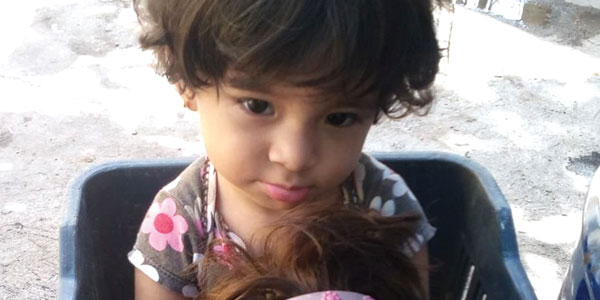
By Jorge Ramos
Fernanda Jacqueline Dávila is 2 years old, and she is locked up. The U.S. government would say that’s not true; that she is well taken care of and fed, that she has a bed, and her own clothes. But the simple truth is that Fernanda is in custody in a detention center for immigrant children, and cannot leave.
Fernanda, a small girl with brown eyes and hair, is from Tegucigalpa, Honduras, but her maternal grandmother, Nubia, brought her to the United States. Fernanda’s mother, Alison Dávila, 21, was not happy with the idea of her daughter and mother making the dangerous trip north, but finally agreed. When Fernanda and her grandmother entered the country, they surrendered to Border Patrol agents.
“Five months earlier, my Mom asked me to let her take my daughter with her,” Alison told me recently, “and she said she would arrange for me to join them two months later. … I didn’t want her to take my daughter away, but she begged me. She wanted to make it through. She said my daughter would have a better future.”
After Fernanda and her grandmother were arrested, they were separated the next day. “My child was asleep,” Alison told me. “That’s when they were separated. My mother wasn’t even told where they would take my child.”
All this happened in late July. Since then, Fernanda has been on her own. She wasn’t returned to her grandmother, who was released from custody and is living in Atlanta, nor was she sent back to Tegucigalpa to be with her mother (Fernanda’s father had died in an accident). She is sitting in a prison for children.
Fernanda and her mother speak every Wednesday and Friday on a video call, with the assistance of a social worker. “She cries a lot,” Alison told me. “She says she wants to be with her mama.” For a while, Alison imagined the worst: that the girl would be put up for adoption. “That was my greatest fear.”
A recent report by The New York Times (nyti.ms/2Nuf6dS) described in detail the day that Fernanda was taken to an immigration court hearing in New York. Her feet dangled from her chair, and she began to cry. The judge, who didn’t speak Spanish, asked questions through an interpreter, but Fernanda remained silent.
It’s understandable: What else is a terrified 2-year-old without her mother or grandmother supposed to do in front of an immigration judge?
There were almost 13,000 immigrant children in government custody in September, up drastically from 2,700 in May 2017, due to new regulations that make it more difficult to reunite these children with relatives or acquaintances. And many parents are afraid that they will be arrested and deported if they try to pick their children up.
Separating children from their parents is a deliberately cruel message from the Trump administration to Central Americans. It is intended to deter them from trying to come to the United States. But I have just returned from the Texas border, where I saw the surge in Central American families firsthand as they arrived and surrendered to immigration agents. Many told me they’d rather face whatever the consequences are of crossing into the country illegally than stay home condemned to a life of violence and poverty in Honduras, Guatemala or El Salvador. Now the latest immigrant caravan of thousands of Central Americans is in Mexico, expected to arrive at the U.S. border in a few weeks.
“This is so bad,” said Alison, referring to the Trump administration’s zero tolerance policy, which separated Fernanda from her grandmother. “No child deserves this. They are causing them psychological damage; these kids must be with their parents.”
An immigration judge eventually decided to deport Fernanda back to Honduras, and Alison told me she will be returned there within 120 days. This puts Alison slightly more at ease, since at least she knows her daughter will not be offered for adoption.
This is the country that President Donald Trump has created — a nation that snatches a 2-year-old girl away from her grandmother, then locks her up for months. And where is the sense of urgency? I can just imagine Trump’s rants and reactions if another country did the same to an American girl.
Fernanda didn’t do anything to deserve to be thrown in prison. She is, after all, only 2 years old.
Two years old.
(You can watch my TV interview with Fernanda’s mother here: bit.ly/2J5fkrg.)
_____________________________________________________________________________________________
Tiene 2 Años y Está Presa
Fernanda Jacqueline Dávila tiene 2 años de edad y está presa. El gobierno de Estados Unidos dirá que eso no es cierto. Que está siendo bien cuidada y alimentada. Que tiene cama y ropa. Pero la realidad es que está encerrada en un centro de detención para niños inmigrantes y no se puede ir.
Fernanda, de pelo y ojos color café, vivía en Tegucigalpa, Honduras. Pero su abuela materna, Nubia, se la llevó a Estados Unidos donde ambas se entregaron a los agentes de la Patrulla Fronteriza. La mamá de Fernanda, Alison Dávila, de 21 años de edad, no estaba muy contenta con la idea de que las dos se fueran al norte. Pero, al final, cedió.
“Mi mamá, cinco meses antes, me estuvo pidiendo que le prestara a la niña para llevársela. Y que en dos meses me mandaba traer a mí”, me dijo Alison en una entrevista. “No quería dejársela. Pero ella me dijo que le hiciera el favor porque ella quería pasar. Que era un mejor futuro [para la niña]”.
La niña y la abuela fueron detenidas al cruzar la frontera. Y poco después fueron separadas. “Migración las tomó”, me contó Alison, “y un día después las separó. La niña estaba dormida. Fue cuando las separaron. No le dijeron [a la abuela] a dónde iban a llevar a la niña”.
Eso ocurrió a finales de julio. Desde entonces, Fernanda está sola en Estados Unidos. No se la regresaron a la abuela, quien ya fue liberada y está residiendo en Atlanta, Georgia. Y tampoco la enviaron a Tegucigalpa, donde vive su mamá. (El papá de Fernanda murió en un accidente.)
Mamá e hija se comunican por videollamada dos veces a la semana, miércoles y viernes, con la ayuda de un trabajador social. “Ella llora bastante”, me dijo Alison, “pidiendo que quiere venirse con mamá”. Y por algún tiempo, la madre se imaginó lo peor: que fuera dada en adopción. “Ese era mi más grande temor”.
Un reportaje de The New York Times (nyti.ms/2Nuf6dS) describe con detalles dolorosos cómo Fernanda fue presentada ante una Corte de Inmigración en Nueva York. Sus pies colgaban de la silla y se echó a llorar. La jueza, que no hablaba español, hizo sus preguntas a través de un intérprete. Pero Fernanda se quedó callada.
¿Qué hace una asustada niña de 2 años, sin su mamá y su abuela, frente a una jueza de migración? En septiembre pasado había casi 13 mil niños inmigrantes en custodia del gobierno de Estados Unidos. Este número ha crecido — de los 2.700 que había en mayo del 2017 — debido a nuevas regulaciones que hacen más difícil la entrega de los niños a familiares y conocidos. Y también al temor de muchos padres a ser detenidos y deportados cuando van a recoger a sus hijos.
Por separar a las familias inmigrantes, el gobierno trumpista decidió, con deliberada crueldad, que quería enviar un mensaje a los centroamericanos para que no trataran de entrar ilegalmente a los Estados Unidos.Pero acabo de regresar de la frontera, de la llamada región del Río Grande en Texas, y vi a montones de familias centroamericanas llegando y entregándose a las autoridades migratorias. Muchos, me lo dijeron, prefieren cualquier cosa en Estados Unidos que vivir condenados a la violencia y a la pobreza en Honduras, Guatemala y El Salvador. De hecho, viene una nueva caravana de miles de personas y deben llegar a Río Grande en unas semanas.
“Está muy mal”, me dijo Alison, sobre la política de “cero tolerancia” que ocasionó la separación de Fernanda de su abuela. “Ningún niño se merece eso. Los enferman psicológicamente. Son niños que necesitan estar con sus papás”.
La jueza, finalmente, decidió regresar a Fernanda a Honduras. “Le dieron 120 días para que regrese”, me explicó la mamá, quien ya está un poco más tranquila porque le dijeron que la niña no será dada en adopción.
Este es el país que ha creado el presidente Donald Trump. Una nación que separa a una niña de dos años de edad de su abuela. Y luego la deja encerrada, sin ningún familiar cercano, por meses. ¿Dónde está el sentido de urgencia? Me imagino la reacción de Trump y la protesta del público si otro país le hubiera hecho lo mismo a una niña estadounidense.
Fernanda nunca hizo nada malo. Pero los planes no salieron bien. Hoy sigue presa.
Y tiene sólo 2 años.
Dos.
Posdata: Aquí está mi entrevista de TV con la mamá de Fernanda: https://bit.ly/2J5fkrg.










